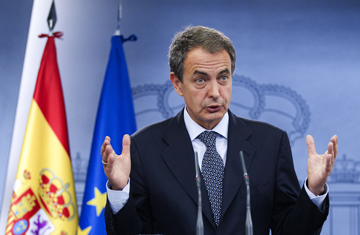
Spain's Prime Minister José Luis Rodríguez Zapatero speaks at a press conference at Madrid's Moncloa Palace on July 29, 2011, announcing an early date for general elections
Talk about your slings and arrows. When José Luis Rodríguez Zapatero took office seven years ago amid the high drama of the Madrid train bombings and a surprise election win, he could not have imagined that his time as Spain's Prime Minister would end with such a whimper. Yet only months after he declared he would not seek re-election, there he was on Friday, agreeing to trim his remaining time in power shorter still. Instead of the scheduled date of March 2012, Spain's next general elections will be held on Nov. 20, 2011.
Then again, Zapatero probably didn't expect to be postponing the start of his summer vacation on Tuesday so that he could more closely monitor spiraling bond yields either. With unemployment hovering around 21% and the markets fretting with renewed vigor about a possible bailout, the robust economy that the Socialist Zapatero inherited in April 2004 is not merely ailing these days but also threatening to go belly-up. Which is why, the Prime Minister said on July 29, he made the decision to move up the elections: "It's better if the newly elected government is in place on Jan. 1 to confront economic challenges and the country's responsibilities."
The news was greeted with relief and even joy by business leaders and the opposition Popular Party (PP). In a press conference held the same afternoon, PP leader Mariano Rajoy called the decision "good news" and added, "Spaniards have been wanting this for a long time."
But with polls predicting a resounding win for Rajoy and the PP, especially after the party swept regional and municipal elections in May, many are wondering if Zapatero's decision wasn't also based on a bit of electoral strategizing.
Those within Spain's Socialist Party (PSOE) firmly reject the possibility. "The Prime Minister made this decision because it's the right thing to do for the country," says Antonio Hernando, deputy coordinator for the PSOE campaign. "And he made it now because it's the right moment; his government has accomplished labor reform, it's reduced the deficit, and it's about to complete its reform of the financial system."
But others aren't so sure. For one thing, unemployment in Spain generally drops in summer thanks to tourism, an improvement that the Socialists would clearly like to take advantage of after years of suffering the highest rates in the euro zone. Sure enough, the day after Zapatero's electoral announcement, the National Statistics Institute announced that unemployment had dropped to 20.9% from 21.3% at the start of the year.
The Socialists may also be hoping to capitalize on the bump in the polls they received when they named Alfredo Pérez Rubalcaba as their candidate. Currently serving as both Deputy Prime Minister and Interior Minister, Rubalcaba is widely seen as the party's safest bet, an experienced politician who gets high marks across the political spectrum for his tough attitude toward ETA, the violent Basque separatist group. In a poll conducted by the Center for Sociological Research and released July 27, Rubalcaba managed to cut the PP's advantage by 3.3%. "The PSOE is definitely trying to sell its Rubalcaba effect," says Daniel Ureña, director of the Spanish branch of MAS Consulting Group, an agency that advises politicians and business leaders. "If they waited until March for the elections, that effect would be deflated."
The new election date also raises questions. Many Socialists believe the only chance for their party is to recapture the leftist base the government has alienated with its austerity measures and labor reforms. For them, as well as for opponents who fear a Socialist mobilization, Nov. 20 doesn't look like a random choice. On that day in 1975, right-wing dictator Francisco Franco died, bringing to an end nearly 40 years of authoritarian rule and paving the way for Spain's peaceful transition to democracy. "There's no way that was just chance," says Ureña. "This campaign is going to have a heavy ideological component to it, and that date, which is historically charged, is a part of it."
Like Zapatero, Hernando denies that Nov. 20 was chosen in hopes of getting more supporters to the polls. Instead, he says the date was selected for purely logistical reasons: it is the one Sunday that doesn't conflict with a holiday weekend, while still allowing enough time for the new government to be in place by the start of the new year. But as a campaign manager, he can't say he's totally unhappy with the choice: "I can't imagine a better way to commemorate Spain's democracy than by voting."
